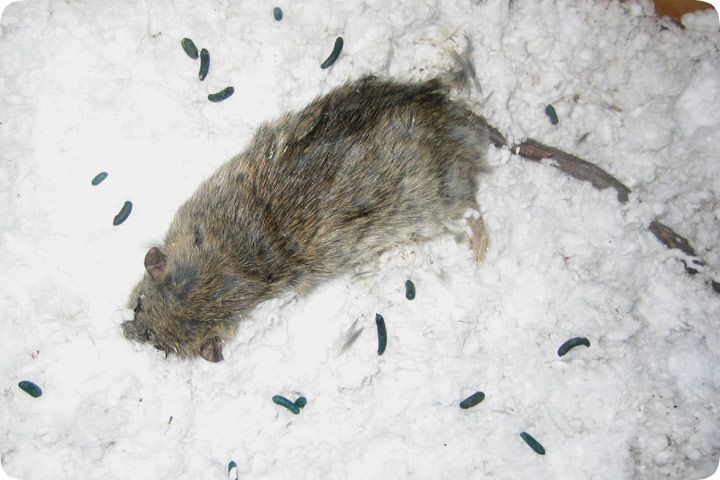-
info@aaanimalcontrol.com
Call us for help in your town
Humane Wildlife Education
Dead Rat Removal Due to Poison

11.05.2005 - What have we here? A regular old smelly dead rat in the attic. Typical case, the homeowner called me with a terrible odor in the house,
and asked me to come out right away and find the source of this ungodly stench that no well educated middle/upper class American citizen should have to endure.
"Why has this horrible fate befallen me?" the lady of the house moaned and groaned. "My delicate nose shant tolerate such an injustice of nature. It is my right
to live in a fresh scented abode."
Apparently it was also her right to spread rat poison in the attic. How do I know this dirty little secret? Like any expert
forensic investigator, I took a good look at the clues. First of all, I saw no external wounds or any blunt force trauma. No lacerations or bullet holes either.
The rat hadn't drowned or suffered 3rd degree burns. The rat's eyes appeared bloodshot - indicating internal bleeding by anticoagulant. I also noticed that
the rats leavings were an odd color - they weren't the usual color of such matter (brown is the usual color in case you've never looked in a toilet before).
The rat terds were actually bright blue - the exact same color as rat poison. I thought carefully about the case and eventually put two and two together.
Some sicko had collected rat droppings and dipped them in 2000 Flushes concentrate, and scattered them in the attic, then electrocuted a rat, sprayed chlorine
in its eyes (for redness) and placed it amongst the droppings. At least that's the explanation I had to deliver, since the homeowner swears that this terrible
smell was not due to her innocent attempt to solve her rat problem herself with a block of blue Wal-Mart rat poison.
Look, people: if you're dumb enough to
try to poison rats, you're going to end up with dead rats in your attic and walls, and it's going to stink. And then new rats will just come in to replace
the old rats. If you read my site at all, you'll get bored with how many times I say this: DON'T POISON RATS. Unless you happen to like the aromatics, and you happen to like meeting me and paying me.
In that case, by all means, do poison rats. You don't want me or your nose out of a job, do you?
Do it yourself: Visit my How To Find and Get Rid of Dead Animals page for tips and advice.
Get professional help: Visit my Nationwide Pro Directory of wildlife removal experts.
For more wildlife stories, click my Wildlife Blog
or click my below banner to hire a local trapper.
A rat infestation is a serious problem that can affect the health of one's near and dear ones immensely. Rodents are capable of inflicting a significant amount of damage to one's property and health. It is best to deal with such an infestation as soon as possible. It is a well-known fact that rodents are nuisances that are particularly hard and frustrating to deal with. These small animals can easily cause a lot of damage if left unchecked. Rats are known for damaging the home internally. As they are smaller in size the advantage that they carry is that these rodents can crawl in or out of places that go unnoticed. Rats are responsible for damaging the insulation of the house and chewing on electrical wires.
Apart from that, the diseases they carry with them can put your well-being in jeopardy. Rats can make their way into the premises in search of food and shelter. These pests look for small cavities around the house in order to get inside and thrive. It is suggested to avoid any and all physical contact with the rat as the diseases it may carry can cause ones' health to cripple.
Rat poison does the necessary job without putting the person in close contact with a rat. After consuming the poison, rats can become dehydrated and come out looking for food. However, in most cases the rats are too weak and hence eventually die. After the rat is dead it is important to remove the rotting carcass from the house as the smell can easily discomfort anyone present. The smell is an indicator of the demise of the rat. This smell can also attract different types of animals and insects. Thus, the removal of the dead carcass must be carried out swiftly.
The problem with the smell does not end there. The stench attaches itself to anything it comes in close contact with. Therefore, the entire area surrounding the carcass should be cleaned and disinfected to remove any remaining odor. The carcass of the rat must also be disposed of in such a way that it stops the environment from getting contaminated. This type of job must be done by professionals with knowledge in the field as this type of job can easily put ones' health at risk. In addition, after the removal of the rodent one must locate and seal all the cavities around the house from which the rat had entered. The sealing will ensure that no other rodent finds its way inside the premises ever again.




















